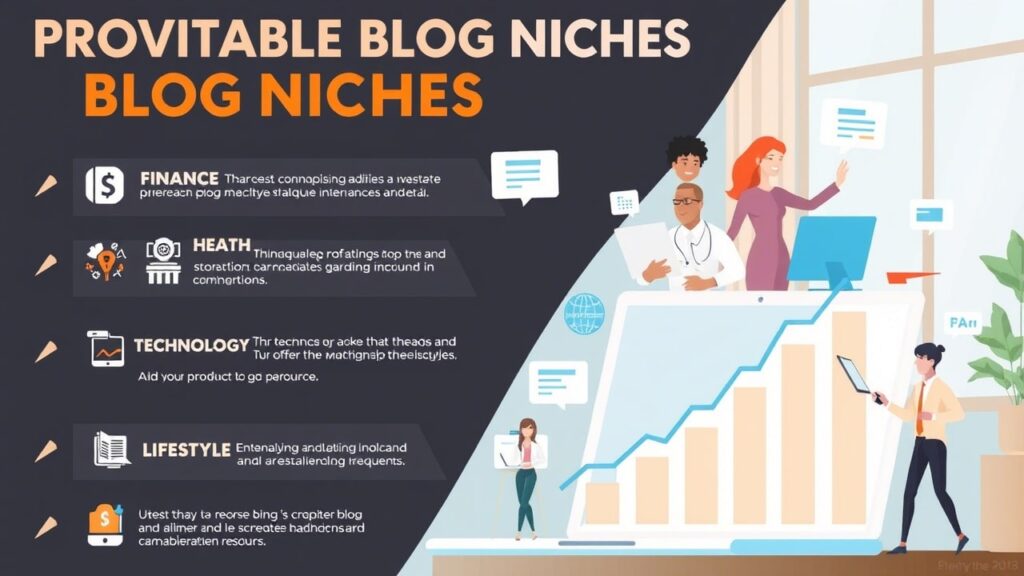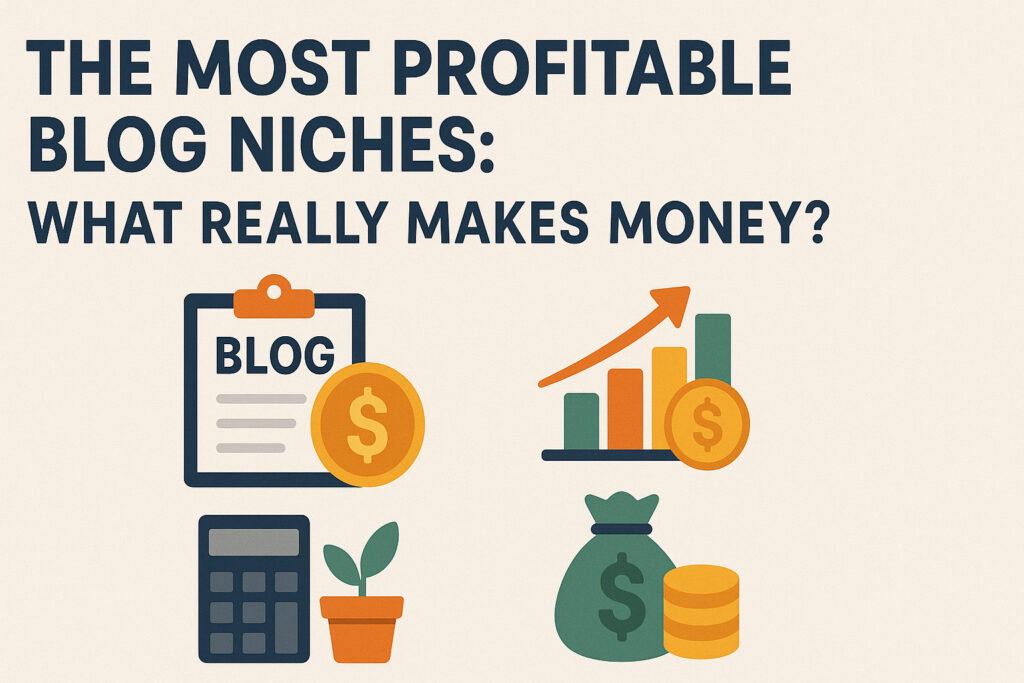So, you’re thinking about starting a blog—but not just any blog. You want to make money from it. Maybe even turn it into a full-time income stream. But with so many topics out there, it’s easy to feel overwhelmed. What should you write about? What’s actually profitable? And more importantly—what works today, in 2025?
Let’s cut through the noise and get real about which types of blogs are the most profitable, why they work, and how you can position yourself for success—no matter which niche you choose.

Table of Contents
What Does “Profitable” Really Mean?
Before we jump into specific blog types, let’s define what we mean by profitable. It’s not just about making a few bucks from Google AdSense. We’re talking about:
- Multiple income streams (ads, affiliates, digital products, services)
- Scalable potential (more income without a ton more effort)
- Long-term viability (topics that will still matter next year—or in 10)
In short: a blog that builds real income and long-term value.
The Top Blog Niches That Actually Make Money
1. 💸 Personal Finance and Money Management
If we had to name the #1 most consistently profitable niche, personal finance would win hands down.
Why? Because this niche has:
- A massive audience (everyone deals with money)
- High-paying affiliate programs (banks, investing platforms, credit cards)
- Brands willing to pay for exposure (financial services spend big on ads)
People want to know how to:
- Save more money
- Pay off debt
- Invest smartly
- Achieve financial freedom
If you can help them with that—even from your own experience—you’re golden.
Monetization ideas:
- Affiliate links for financial tools
- Sponsored posts from fintech companies
- Ebooks or courses on budgeting or side hustles
- Email newsletter sponsorships
Real blog examples: DollarSprout, Clever Girl Finance, Budgets Are Sexy
2. 🧘♀️ Health, Wellness & Fitness
This niche has grown tremendously—and it’s not slowing down anytime soon. In a post-pandemic world, more people than ever are focused on taking care of their physical and mental health.
Whether you specialize in:
- Home workouts
- Holistic wellness
- Mental health
- Nutrition or weight loss
- Women’s health
…there’s space for you.
Why it’s profitable:
- Endless product opportunities (supplements, gear, fitness apps)
- Evergreen content (like “10-minute workouts” or “healthy smoothie recipes”)
- Loyal, engaged readers
Monetization ideas:
- Affiliate programs (e.g., Amazon, MyFitnessPal, vitamins)
- Selling courses or guides (meal plans, meditation journals)
- Partnering with wellness brands
- YouTube videos or private memberships
Real blog examples: Fit Mother Project, Yoga with Adriene (YouTube/blog), The Real Food RDs
3. 💼 Make Money Online / Business and Marketing
This niche may seem saturated, but it still pays extremely well—especially if you’ve built expertise or results in online business, freelancing, or marketing.
People will always look for:
- Side hustle ideas
- Ways to earn income remotely
- How to start their own business
- Marketing strategies that actually work
What makes it lucrative:
- Audiences often have a “ready to invest” mindset
- High-ticket affiliate offers (like email platforms, CRMs, business tools)
- Digital product potential (courses, coaching, eBooks, templates)
Monetization ideas:
- Premium courses or community access
- Selling your own services (consulting, SEO, design, etc.)
- Affiliate links for business tools
- Offering templates or swipe files
Real blog examples: Adam Enfroy, Smart Passive Income, Blogging Wizard
4. 🍳 Food and Recipe Blogs
Food blogs are not just about pretty pictures of avocado toast anymore. They’re serious income machines when done right.
What makes this niche powerful:
- Millions of people search for recipes daily
- Great opportunities for video content (which boosts monetization)
- Sponsored content from food brands, grocery chains, and kitchen tools
If you can add a twist—like vegan recipes, budget meals, or cultural dishes—you can stand out.
Monetization ideas:
- Affiliate links for kitchen gadgets
- Branded recipe sponsorships
- Display ads (great RPMs on food content)
- Creating your own cookbooks or printables
Real blog examples: Minimalist Baker, Budget Bytes, Skinnytaste
5. ✈️ Travel (Especially Niche Travel)
Yes, travel blogging took a hit during the pandemic, but it’s made a big comeback. Especially when paired with niche content like:
- Budget travel
- Solo female travel
- Van life or RV living
- Luxury or adventure travel
People love to read about real experiences, tips, and how to travel smarter.
Why it’s profitable:
- Affiliate income from travel insurance, tours, gear
- Sponsored stays and destination partnerships
- Huge potential for YouTube, Instagram, and email marketing
Monetization ideas:
- Itineraries and travel guides
- Affiliate partnerships (hotels, gear, booking sites)
- Paid travel collaborations
- Digital products (packing lists, budget tools)
Real blog examples: The Blonde Abroad, Nomadic Matt, Hey Nadine
6. 🏡 Home, DIY, and Lifestyle (With a Spin)
Lifestyle blogs are broad, but the most profitable ones narrow in on something specific—like minimalist living, organization hacks, or sustainable home tips.
The reason they can be so profitable is because they touch people’s daily lives. They blend practical value with beautiful visuals—perfect for platforms like Pinterest and Instagram.
Popular sub-niches:
- Home decor
- Cleaning and organizing
- DIY crafts
- Parenting tips
- Sustainable living
Monetization ideas:
- Affiliate links for home products
- Sponsored content with home/lifestyle brands
- Selling printables or planners
- Display ads (great for lifestyle content!)
Real blog examples: The Inspired Room, Clean Mama, The Organized Mom
What Makes a Blog Truly Profitable (No Matter the Niche)?
Now that you know the “what,” let’s talk about the “how.”
Even in a hot niche, profitability won’t happen overnight. But these key ingredients make all the difference:
✅ Trust and authority
People buy from people they trust. Building credibility—through stories, helpful content, or showing results—makes you 10x more likely to convert visitors into buyers.
✅ Email list growth
An email list is your most valuable asset. Unlike social media, you own your list—and it’s where a lot of the sales magic happens.
✅ Strategic content planning
Don’t just post random articles. Write SEO-friendly content, answer specific questions, and create helpful series or lead magnets.
✅ Multiple income streams
Ads are fine, but you want to combine them with affiliates, digital products, services, and sponsorships to hit that full-time income goal.

Final Thoughts: Choose a Profitable Blog That Feels Right for You
You don’t have to chase the “hottest” niche. The best blog for you is where your interests, expertise, and audience demand intersect. Profitability follows when you’re able to provide real value, attract the right readers, and monetize smartly.
So whether you’re passionate about budgeting, baking, or building an online empire—your blog can absolutely be profitable
Just start, stay consistent, and serve your audience well. The income will come.


This is such an insightful read! I love how it breaks down the potential of niche blogging in such a practical way. It’s true—people are more focused on health and well-being now, and that opens up so many opportunities. The idea of adding a unique twist to stand out, like vegan recipes or cultural dishes, is brilliant. I’m curious, though—how do you balance creating authentic content while also focusing on SEO and monetization? It feels like a tricky line to walk. Also, do you think travel blogging will continue to grow, or is it just a temporary post-pandemic trend? I’d love to hear your thoughts on this!
Thank you so much for your kind words! 😊 I’m really glad you found the post insightful.
You’re absolutely right—health and well-being have become major focus areas, and that shift brings exciting opportunities for niche bloggers. Adding a unique twist like vegan recipes or cultural variations not only helps you stand out but also builds a loyal community that shares those interests.
Balancing authenticity with SEO and monetization is definitely a fine line. What’s worked for me is starting with genuinely helpful content—something that solves a problem or adds real value—and then optimizing it for SEO afterwards. That way, the core of your blog stays authentic, and SEO becomes a tool to reach the right people rather than just chasing traffic. For monetization, I try to align it with the audience’s needs—like recommending tools or products I genuinely use and trust.
As for travel blogging—great question! While the post-pandemic spike may have settled, I believe travel blogging still has long-term potential, especially when it’s combined with strong storytelling or a focused niche (like budget travel, eco-tourism, or cultural experiences). People are always looking for inspiration and practical tips, so there’s definitely room for growth if you bring a unique voice to the table.
Thanks again for such a thoughtful comment! Looking forward to more of your insights 😊
This text is a fantastic deep dive into the world of niche blogging and its potential. I especially appreciate the emphasis on adding a unique twist, like vegan recipes or budget-friendly travel tips—it’s a great reminder that originality still matters. The point about blending practical value with beautiful visuals is spot on; it’s exactly what platforms like Instagram thrive on. I’m curious, though—do you think the rise of AI tools might change the game for content creators? And how important is consistency versus quality in building a sustainable blog? Personally, I think storytelling is the secret sauce for building trust, and this post reinforced that belief. Would you agree? Let’s keep this discussion going—what’s your take on balancing SEO with authenticity in blogging?
Thank you so much for the kind words and thoughtful insights! 🙏 I’m really glad you connected with the idea of adding a unique twist—it’s true, in the crowded world of blogging, originality still shines bright 🌟
You’ve raised some fantastic questions, so let me dive in:
🔹 **AI Tools & Content Creation:**
Absolutely, AI is reshaping the content game in a big way—from speeding up research and ideation to even generating drafts. But I believe it should be a *support tool*, not a replacement for human creativity. The real magic still happens when we bring in our unique voice, experience, and storytelling.
🔹 **Consistency vs. Quality:**
This is a classic debate! Ideally, we need a healthy balance. Posting consistently helps with SEO and audience retention, but if quality drops, it can hurt your credibility. I usually recommend starting with a manageable schedule where each post reflects your best effort—then ramp up frequency as your workflow improves.
🔹 **Storytelling & Trust:**
Couldn’t agree more—storytelling is the heart of connection. Facts inform, but stories *inspire*. Whether it’s your blogging journey, a customer experience, or even a lesson learned the hard way, weaving in personal stories builds real trust.
🔹 **SEO vs. Authenticity:**
Great question. SEO is essential for visibility, but authenticity is what keeps people coming back. The key is to write for *humans first*, and *optimize smartly*. Keywords can be integrated naturally when you deeply understand your audience’s language and needs.
Thanks again for sparking such a rich discussion. I’d love to hear your thoughts—how are *you* currently using AI or storytelling in your content?